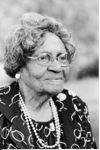|
|
|
|
|
|
|
Students-Excerpts From Many Voices : Mrs. Elsie B. Godwin
|
|
|

Mrs. Elsie B. Godwin
I remember starting my teaching career in the early twenties in three rooms Trinity Elementary School located on highway 709 near Emmanuel Baptist Church. Mr. L. T. Hall was School Superintendent and a Mrs. Mary Roberts was principal. I taught third and fourth grades and remember that my salary was $45.00 big dollars a month.
I lived with my parents three miles from school and drove my father’s white horse and buggy to school each day. The horse was soon educated and we did not need any reins to direct her. We did not have a janitor, but as a rule, the teacher was first to get to school along with other early students and made the fire in a flat top iron stove. The parents furnished the wood for the stove. In later years, the school was given a potbelly stove and coal for it by the county. The students were responsible for cleaning the school at closing time.
There was organized in the school a Senior League (P.T.A.), Mother’s League and Junior League, each to help furnish some of the needs of the school that the county did not give.
I recall most of the students as being obedient and cooperative and when discipline was necessary, a switch was used or the child was asked to stand in the corner on one foot. If we had minor problems in the school, we had the cooperation of the parents. I feel that today the parents and teachers should work closer together in order to try and solve some of the discipline problems.
In later years, I had charge of the fifth, sixth and seventh grades until the seventh grade was sent to the Isle of Wight Training School. To get to Isle of Wight Training School, the students had to walk there.
During harvest time most of the black children had to stay home to harvest crops, especially if they lived on a farm. Even then, the school year consisted of 4 to 5 months a year.
I remember that the parents bought the acre of land for Trinity School, built it and then deeded the land to the county. Parents made benches for the children to sit on but later came desks and tables. Trinity School students were those who had earlier gone to Foxes Crossing School and Godwin School before they were closed. By then there were school buses available. Years later, when the school was no longer used, Emmanuel Baptist Church, which was next door, had to buy back the land and school its members had earlier given.
A 4-H Club was organized at Trinity School by Mr. Woodrow Odom, Farm Agent. I felt that the Club was indeed helpful in training the pupils to be more helpful and good citizens.
Mrs. Georgie Tyler, a Jeanes School Supervisor, was not only an asset in training the minds as well as the hands of the student, but also inspired me to become a teacher. I remember her early schooling quite clearly. Parents had to play a major role in providing for the education of their children. My father donated a parcel of land across the road from my house for what became known as the Bailey School. I remember Mrs. Lillie Hall Bailey as being my teacher with 10-20 other students in the school.
I worked 42 years before retiring. What I fondly remember about my last years of teaching were fewer children in classes, better salaries for teachers and having to teach only one subject instead of several.
The book Many Voices was published in 1986 as part of a project of the Interview Committee appointed in 1984 for the Isle of Wight County 350th Sesquitricentennial Celebration. The Oral History project taped the recollections of our older citizens and developed their stories from the transcriptions. Many Voices gave a permanent record of the previously unrecorded family life and history in Isle of Wight County. These excerpts take only the discussions dealing with the education memories of some of those citizens.
|
|
|
|
|
|
|
|
|
|
|
 |
Copyright 2016. The Schoolhouse Museum. Website developed by
WSI Login |
 |
|
|
|